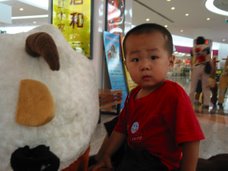According to yesterday's Telegraph report, Chinese government has hinted that it could liquidate its vast holding of US treasuries if Washington imposes trade sanctions to force a yuan revaluation. The threat is described as "nuclear option", giving the magnitude and scale of the economic threat by China.
China hold massive reserve of US treasury, giving its leverage over the United States. It is easily concluded that the liquidation would lead to great depreciation of US dollars, and consequentially drag the American economy, which has been set back by the ongoing credit crisis stirred off by sub-prime mortgage default, into recession.
However, it would be zero sum game since the move by China would also backfire,due to the increasingly inter-dependency between the two economic powers. Chinese exports would become more expensive, which could be the last thing on the mind of Chinese government.
So will China go ahead with the "nuclear option", or simply big cry and little wool? Or will US back down or simply call China's bluff? it is a very typical game theory, in this case, a game of chicken.
The name "Chicken" has its origins in a game in which two drivers drive towards each other on a collision course: one must swerve, or both may die in the crash, but if one driver swerves but the other does not, s/he will be called a "chicken".
So if both China and US won't like to be named "chicken", the worst outcome will be incurred for both players in the game. The Nash equilibrium would be a scenario where one will make the best decision whatever decision the other makes. At the equilibrium, no one would be motivated to change his strategy unilaterally. In the case of Chinese economic threat, it seems that there are two Nash equilibriums, that is either US backs down or China backs down.
But that is the scenario on paper. In reality, not everyone could make rational decision, and as Herbert Simon points out, there is often the bounded rationality as people are partly rational.
There will be a lot of hand-wringing or haggling behind the scenes now. What is exciting is probably not the result of the game, but its process.
Subscribe to:
Post Comments (Atom)

No comments:
Post a Comment